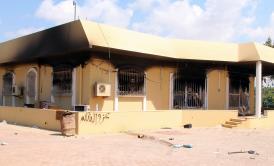The Washington Post:
More than three weeks after attacks in this city killed the U.S. ambassador to Libya and three other Americans, sensitive documents remained only loosely secured in the remains of the U.S. mission here on Wednesday, offering visitors easy access to delicate details about American operations in Libya.
Documents detailing weapons collection efforts, emergency evacuation protocols, the full internal itinerary of Ambassador J. Christopher Stevens’s trip and the personnel records of Libyans who were contracted to secure the mission were among the items scattered across the floors of the looted compound when a Washington Post reporter and a translator visited Wednesday.
This, of course, isn’t the first time that reporters have come across sensitive info while sifting through the remains of the U.S. mission in Benghazi. CNN managed to find a private journal written by Stevens that apparently expressed his security concerns in the lead-up to the terrorist attack. The State Department reacted to questions about the journal and whether the compound had been properly secured, shall we say, less than professionally.
Read the full Washington Post article here.
